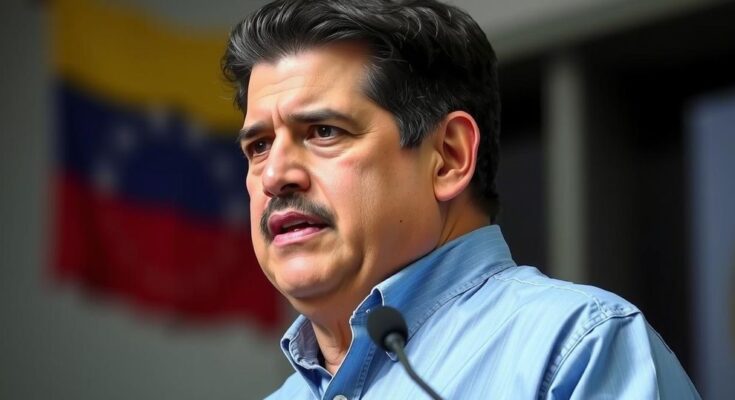Nicolás Maduro’s recent swearing-in for a third term as president of Venezuela has been widely condemned as a power grab following a fraudulent election. Venezuela’s situation is characterized by opposition unrest and increased regional solidarity against Maduro’s authoritarian regime. Experts urge concerted international support to facilitate a transition to democracy.
On January 5, 2025, Nicolás Maduro was sworn in for a third term as president of Venezuela, following an election considered fraudulent. Reports indicated that opposition candidate Edmundo González received more votes, highlighting the illegitimacy of Maduro’s claim to power. The Maduro regime has intensified its repression against dissenting voices, exemplified by the detention of prominent opposition leader María Corina Machado. As local and international opposition solidifies against him, experts share insights regarding what this political turmoil means for future governance in Venezuela.
A united front of Latin American leaders has emerged, denouncing Maduro’s actions and affirming González’s electoral victory. The current situation has drawn condemnation from a spectrum of leadership, from left to right, signaling a collective rejection of Maduro’s authority. This unprecedented solidarity may create an opportunity for international diplomacy to support democratic movements within Venezuela.
Increasing political pressures from both domestic opposition and the international community could force Maduro to reconsider his strategies. Despite holding military power, the regime is showing signs of internal dissent, with key figures within the Chavista coalition now being apprehensive about long-term governance amid economic hardship and global isolation. The Biden administration’s response, such as introducing sanctions, is seen as inadequate to address the enforcement of democracy in Venezuela.
Going into 2025, the Venezuelan opposition faces critical decisions regarding electoral participation amidst the conditions set by the Maduro regime. An effective coordination among diverse opposition factions is crucial for mounting a resilient challenge to Maduro’s government. The commitment of international allies remains paramount as civil society continues to advocate for the restoration of democratic principles and freedoms, even in the face of systematic repression.
The political landscape in Venezuela has been tumultuous, especially following the disputed elections in July 2024 when Edmundo González emerged with significant electoral support. Nicolás Maduro, however, asserted victory despite evidence to the contrary. The Maduro regime’s repressive tactics against dissent have included detentions of opposition leaders and increased sanctions from the United States aimed at undermining Maduro’s authority. The reaction from the Latin American community and responses from upcoming political frameworks could significantly shape the future of Venezuela’s governance.
In conclusion, Maduro’s inauguration for a third term amidst allegations of election fraud signifies a troubling continuance of autocratic rule in Venezuela. However, the unification of Latin American leaders against his governance presents a pivotal moment for international diplomatic efforts. For the Venezuelan opposition to succeed, it must address internal divisions and collaborate effectively, while external allies must take decisive action towards fostering democracy in Venezuela.
Original Source: www.atlanticcouncil.org




